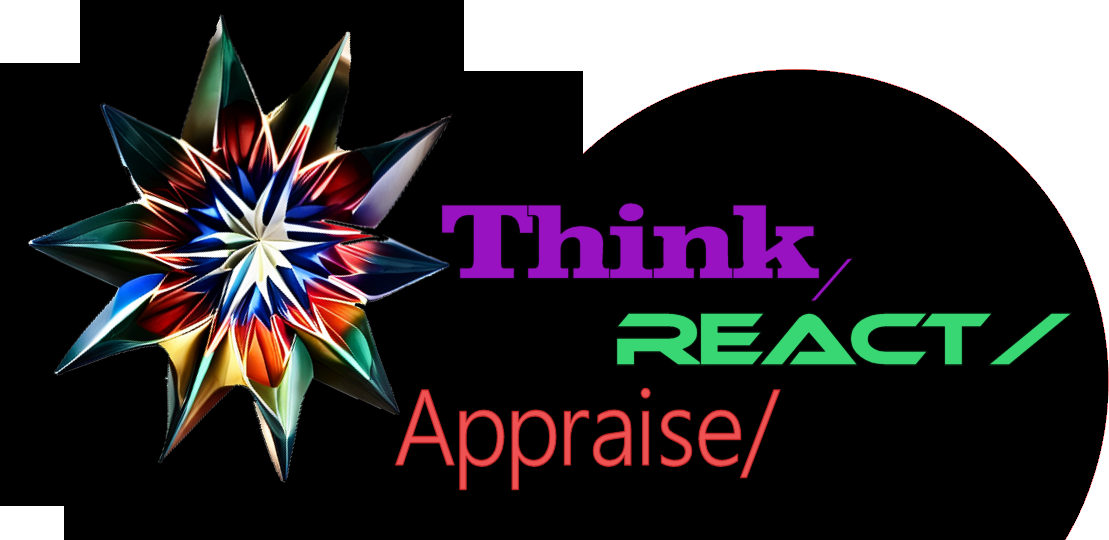
Think/React/Appraise
Think/React/Appraise
We are fostering a community of discourse about the various avenues of original fiction. We accept well-written submissions that may be labeled as any of the following:
- thought pieces,
- reflective essays,
- personal reactions,
- reviews, and/or
- appraisals.
Submissions must focus on either (a) published works, including games, graphic novels, narrative novels or shorter stories, or (b) previously broadcast screenplays.
Typically, a Think/React/Appraise review piece runs between 1,000 and 3,000 words and is tightly focused on a single work, a collection, or specific creators.
We seek a positive discussion of the merits and values of the focal work(s) or creators. We seek to avoid discussions that include the excessive use of profanity. We prohibit pieces that seek to demean a person (or persons) and/or their body of work.
The three keys to a successful Think/React/Appraise piece are:
- be thoughtful,
- use a personal voice, and
- create positive value for the larger Speculative Fiction community.
Submissions may include a photograph and a short (150 word) biography.
~~~
NOTE:
The opinions of the reviewers are their own and do not necessarily reflect those of the staff of Appaloosa Radio Online or the members or officers of Sacramento Suburban Writers.
We welcome submissions!


Think/React/Appraise - May 15, 2023
Time to stop creating
“top 15” lists
Think/React/Appraise
May 15, 2023
Time to stop creating “top 15” lists
YouTube is filled with “lists” of someone’s “top 15” books. I spent an hour searching and I found over 70 such lists. (I did it the old -fashioned way. I may have found even more had I used Chat-GP, the new Bing, or the new Bard.) Someone who purports to “love” speculative fiction earnestly looks into the camera and “explains” why their choice for “number one” is more deserving than their choice for “number three.” Having viewed a number of these sites, I can attest that very few of these lists agree with each other.
I say it is time to stop wasting time creating “top 15” lists.
To be sure, there is some value to rank-ordering works. On our own Appaloosa Radio Online site, we devote a page to re-publishing the rankings of the “works of short fiction” found on the Internet Speculative Fiction Database (ISFDB) that Al von Ruff maintains. These rankings are compiled from the users themselves, and they help libraries decide which works to purchase. However, the ISFDB list runs to 175 entries. There is no deep soul-searching about selecting the “number one.”
When I viewed these YouTube videos, I was reminded of the old “top 40 music countdown” that Casey Kasem used to do on FM radio. The format was designed to maintain listeners’ interest so they could play more commercials. There was the constant tease about what song was “number one this week.” Keep listening fifteen minutes more and you will know. Listen for ten minutes more and you will know.
Unfortunately, while the old Casey Kasem radio show was a highly professional organization using the best talent in the radio business, the YouTube videos that I watched are often shot using just a smartphone and lack even the basic elements of video production. Raw and mostly unedited.
What they lack in video production qualities, they make up for with their intense passion. It really matters to them whether a work is ranked Number 14 or Number 13.
I have seen the same passion in sports-talk discussions. Who is the greatest quarterback of all time (G.O.A.T.)? Intensely passionate confrontations. Strong opinions. Absolute certainty.
(BTW, for me the G.O.A.T has to be Joe Namath and his ridiculous fur coats. No other Super Bowl win had such an immense historical impact, completely changing the league, its audience, and its marketing.)
I have recently re-read Ursula K. Le Guin’s The Left Hand of Darkness.
I found it in a collection of her works published by the Library of America (viz., Hainish Novels and Stories, Vol. 1: — edited by Brian Attebery).
This is a dense, print-only version. No graphics other than a map on the frontispiece. In this format, it is a work that must be read, with pages that must be turned. It is a throwback. Back to the time when it was originally published.
Speaking of “back when.” In the novel, crackly, staticky A.M. radio plays an important role. When the novel was published, it was still common for many of us to get our news from A.M. radio. Not the internet. Not even television. No, we often listened to the news in our cars, as it was broadcast over A.M. radio.
Now, if you are a passionate, contemporary consumer of speculative fiction, and you want to primarily read works that feature the very latest in technology, then when you see that Le Guin featured what now seems an extremely ancient technology, you may feel disappointed with the work. Her work may not even make your “Top 15” listing.
Likewise, if your taste in fiction fixates on space adventures like that of Star Wars or Star Trek, you will probably be disappointed with Le Guin.
And, if your preference is romantic love with a little space fiction mixed in, Le Guin will not be to your taste.
Indeed, I found The Left Hand of Darkness was listed on less than a third of the sites I viewed.
Which makes my point. What does it mean to be ranked in these various YouTube shows? Does it mean the show’s host liked it? Does it mean that the work has lasting value? Does it mean that another reader might enjoy it?
I even read one reviewer who wrote that she did not enjoy reading Le Guin’s novels because their plots were too complicated!
I want to call these various rankings “artificial,” but that is not correct. “Artificial” means phony, not real. A better descriptor would be “subjective.” Another might be “idiosyncratic.”
So, what does a subjective, idiosyncratic ranking mean?
Maybe the discussion would be simpler if we returned to sports-talk and the perpetual argument about the G.O.A.T. Are these arguments phony? Not to the participants. Subjective and idiosyncratic? Clearly. Unresolvable? Probably.
Then why do it? Because for some people, arguing about the G.O.A.T. over a beer is their way of having fun. Does it matter? Probably not. Will they continue to do it? Certainly.
For me, however, these YouTube videos trivialize the experience.
Back to my latest experience with The Left Hand of Darkness. I found that it read quickly. The text itself carried me along. I felt immersed in this world.
Most importantly, it contained many passages that made me think. Ponder just a bit.
That most remarkable woman from Portland’s tranquil Forest Park neighborhood takes us to places we never expect to go. Indeed, she began The Left Hand of Darkness with an important, but always relevant reminder.
“I’ll make my report as if I told a story, for I was taught as a child on my homeworld that Truth is a matter of imagination. The soundest fact may fail or prevail in the style of its telling: like that singular organic jewel of our seas, which grows brighter as one woman wears it and, worn by another, dulls and goes to dust. Facts are no more solid, coherent, round, and real than pearls are. Both are sensitive.”
~~~

